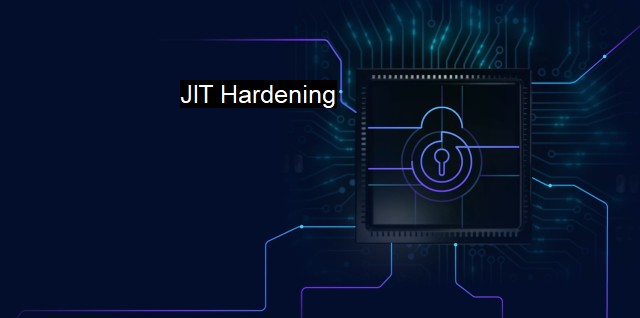What is JIT Hardening?
Understanding the Concept of Just-In-Time (JIT) Hardening and Its Benefits to Cybersecurity
JIT hardening is a cybersecurity and antivirus principle progressively gaining attention for its effectiveness in safeguarding computer systems from vulnerabilities that hackers may exploit. The abbreviation "JIT" stands for "Just-In-Time," which applies in this context to the way in which a computer system counteracts threats. Hardening refers to measures taken to secure software beyond default settings. In applications relating to cybersecurity and antivirus, JIT hardening is a phase during which the enhanced security of a network, system, or application is fortified right around the time needed to protect against identified or potential vulnerabilities and threats.Often, JIT hardening works hand in hand with other functions of threat mitigation, such as a JIT compiler commonly used in many programming languages. JIT compilers hold important implications for software security; since they can compile programs just in time for execution, they may expose system vulnerabilities that could be exploited by attackers if not well secured. This is what led to the development of JIT hardening techniques - these are designed to insulate JIT compilers and reduce their potential as security liabilities.
Without JIT hardening, executed code might be tampered with by an attacker, rendering a system or network vulnerable. Known code modification exploits or techniques include heap spraying, JIT spraying, and return-oriented-programming (ROP), among many others. These threats leverage vulnerabilities inherent to JIT architecture. With JIT Hardening, security mechanisms are put in place to ensure that attackers cannot easily indulge in these activities.
JIT hardening techniques vary based on the application but generally aim to mitigate vulnerabilities through approaches like memory separation, code randomization, and minimizing sensitive data exposure. Memory separation helps to isolate various functional settings so that an attack on one area would be unlikely to spill over into another. Code randomization aids in making code unpredictable, thus making it more difficult for an attacker to find and exploit vulnerabilities. Minimizing sensitive data exposure involves the reduction or elimination of hacker access to sensitive information which could facilitate an attack.
In addition to these, some applications make use of hardening measures that are more specialized, like read and execute functionalities (W^X), where data written into memory cannot be executed. This helps limit vulnerabilities in which data loaded by a program can be manipulated for execution, thereby preventing potential attacks. Techniques such as the guards around allocated code memory sections are also used.
One profound advantage of JIT Hardening lies in its non-disruptive nature. Endeavors to harden JIT need not interrupt system performance or efficiency since JIT hardening operates in the runtime phase of code execution. This runtime application ensures that while keeping systems secure, the overall efficiency and productivity of a solution aren't hindered.
Yet, while JIT hardening has numerous advantages, like any cybersecurity principle, it doesn't guarantee full-spectrum security. To ensure robust cybersecurity, it should be combined synergistically with other security measures like secure coding practices, regular system updates, penetration testing, and multi-factor authentication among others.
JIT Hardening is a crucial element of cybersecurity architecture aimed at reinforcing software security particularly with JIT compilers. By implementing this line of defense, possible attacks on system vulnerabilities can be minimized. despite the advantages, it should be noted that it is only one aspect of a multi-faceted cybersecurity strategy.

JIT Hardening FAQs
What is jit hardening in cybersecurity?
JIT hardening is a process of securing Just-In-Time (JIT) compilers used by applications to optimize their performance. It involves applying security measures to prevent malicious attacks on the JIT compiler and enhance the protection of the application against malware.Why is JIT hardening important in antivirus software?
JIT-based attacks are becoming increasingly common, so antivirus software vendors are focusing on JIT hardening to secure their products against such attacks. By strengthening the JIT compiler, antivirus software can prevent attackers from exploiting vulnerabilities in the compiler and executing arbitrary code on the target system.How do JIT-hardened antivirus products protect against JIT vulnerabilities?
JIT-hardened antivirus products use a variety of techniques to protect against JIT vulnerabilities, such as sandboxing, stack isolation, and code signing. By isolating the JIT compiler and monitoring its behavior, these products can detect and prevent malicious activity before it can cause damage.What are the benefits of JIT hardening in cybersecurity?
JIT hardening provides several benefits in cybersecurity, including enhanced protection against malware and other cyber threats, improved performance of JIT-based applications, and greater confidence in the security of systems using JIT compilers. Additionally, JIT hardening can help organizations comply with security regulations and standards, such as PCI DSS and HIPAA.| | A | | | B | | | C | | | D | | | E | | | F | | | G | | | H | | | I | | | J | | | K | | | L | | | M | |
| | N | | | O | | | P | | | Q | | | R | | | S | | | T | | | U | | | V | | | W | | | X | | | Y | | | Z | |
| | 1 | | | 2 | | | 3 | | | 4 | | | 7 | | | 8 | | |||||||